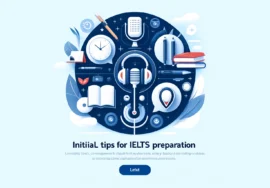
IELTS Speaking Test: Dominate with These Tips & Tricks
Want to ace the IELTS Speaking test? Discover expert tips and strategies to improve your fluency, pronunciation, vocabulary, and grammar. Learn how to stay confident, organize your answers, and communicate effectively to achieve a high band score in IELTS Speaking. Start mastering the test with practical advice today!
IELTS Speaking Test: Dominate with These Tips & Tricks
Introduction
The IELTS Speaking test is a critical section of the IELTS exam designed to evaluate your spoken English skills in real-life situations.The test is divided into three parts, and each part assesses different aspects of your speaking ability.

- Part 1: Introduction and Interview (4-5 minutes)
In this part, the examiner will introduce themselves and ask you some basic questions about yourself. These might include your name, where you live, what you do, your hobbies, and your family. The goal is to make you feel at ease and comfortable with the interview process. Your answers don’t need to be complex, but you should aim to respond clearly and confidently. - Part 2: Long Turn (3-4 minutes)
You will be given a card with a topic and some prompts. You will have one minute to prepare your response. After this, you must speak for up to two minutes on the topic. During this part, you will demonstrate your ability to organize your thoughts and speak continuously. It’s important to make the most of this preparation time to think about what to say. The examiner won’t interrupt, so it’s an opportunity to show how well you can present your ideas. - Part 3: Discussion (4-5 minutes)
This part follows the long turn, and it involves a deeper discussion of the topic from Part 2. The examiner will ask you more detailed and abstract questions, allowing you to showcase your ability to reason, explain, and defend your views. The conversation is more complex, and you are expected to articulate opinions, provide justifications, and elaborate on ideas.
Each of these parts plays a role in evaluating fluency, vocabulary, grammar, pronunciation, and the ability to organize and express ideas effectively. Now, let’s explore practical tips and strategies to help you succeed.
Tips for Fluency and Coherence
Fluency and coherence are crucial for a high score in the IELTS Speaking test.Fluency refers to your ability to speak without excessive pauses, hesitations, or self-corrections, while coherence is about organizing your ideas logically and making them easy to follow.

- Practice Speaking Regularly: Consistent practice is the key to fluency. The more you practice speaking, the less likely you are to hesitate or struggle for words. Engage in conversations with English speakers, or use language exchange platforms, or even practice with friends or family members. You can also simulate real exam conditions by recording your responses to common IELTS Speaking topics and reviewing them later to identify areas for improvement.
- Use Linking Words and Phrases: Linking words play a significant role in making your speech coherent and easy to follow. These words act as bridges between ideas and show how they are connected. Some examples of linking words include: For example, in addition, on the other hand, moreover, as a result. These help you to move smoothly from one point to another and demonstrate your ability to connect ideas logically. Don’t overuse them, though; only use them when necessary to make your speech more natural.
- Expand Your Answers: Providing more than a brief, single-sentence response is essential to demonstrate fluency and coherence. If asked, “Do you like traveling?”, instead of just saying “Yes,” try to elaborate on why you like it, where you’ve traveled, and what kinds of trips you enjoy. A well-rounded answer shows you can expand on a topic and share your thoughts in detail. This will also help you avoid awkward silences.
- Think in English: Try to think directly in English instead of translating from your native language. This helps you to respond faster and more naturally, as it reduces the mental effort required to convert ideas from your first language into English. It also prevents awkward pauses while you search for the right words.
- Use Fillers Sparingly: While a few natural fillers like “well” or “let me think” can help you gather your thoughts, try to avoid overusing them. Over-relying on fillers can make you sound less confident and fluent.
Pronunciation and Intonation
Clear pronunciation and appropriate intonation are essential for being understood and for sounding natural in English. Mispronunciation or monotonous speech can affect your communication and your score.

- Work on Pronunciation of Commonly Mispronounced Words: Some English words have tricky pronunciation. For example, words like “comfortable,” “squirrel,” and “interesting” can be difficult for non-native speakers. Make a list of words you struggle with and practice them regularly. Listening to podcasts, watching movies, or using apps like ‘Forvo’ can help you hear how native speakers pronounce these words.
- Use Stress and Intonation Effectively: English speakers naturally emphasize certain words in sentences to convey meaning, and this stress pattern varies from language to language. In English, content words (nouns, verbs, adjectives) tend to be stressed, while function words (prepositions, articles, auxiliary verbs) are not. For example: ‘I love going to the beach.’ You can also alter your intonation to express different emotions. Rising intonation at the end of a sentence can indicate a question, while falling intonation often indicates a statement.
- Avoid Monotone Speech: Speaking in a monotone voice (with no variation in pitch) can make your speech sound flat and unengaging. Use pitch changes and rhythm to emphasize important points and keep the listener interested.
- Record Yourself: Listening to recordings of your own speech can be a great way to identify pronunciation issues or areas for improvement. Pay attention to your stress, intonation, and overall clarity.
Vocabulary and Grammar
A diverse vocabulary and good grammar are essential for a high IELTS Speaking score. Being able to express yourself with precision and variety is key to showcasing your language skills.

- Expand Your Vocabulary: To achieve a high score, you need to demonstrate a wide range of vocabulary. Instead of repeatedly using simple words like “good,” try to use synonyms like “fantastic,” “remarkable,” or “outstanding.” The same goes for common adjectives like “big” (you can use “enormous,” “huge,” or “massive”). Practice by learning new words and their synonyms. Make use of vocabulary lists and focus on thematic groups, like words related to travel, technology, or the environment.
- Paraphrase Effectively: In IELTS Speaking, it’s important to show that you can express the same idea in different ways. For instance, if asked, “What do you think about the environment?” you can paraphrase your response by saying, “I believe the environment is crucial for our survival.” This demonstrates your ability to use varied language and avoid repetition.
- Use a Range of Sentence Structures: To score well in the grammar category, make sure to use a variety of sentence structures. Practice forming complex and compound sentences using conjunctions like “because,” “although,” “despite,” or “while.” For example: ‘Although I enjoy traveling, I also like staying at home during the holidays.’ Such sentence structures show your ability to express more complex ideas and provide a more detailed response.
- Avoid Overusing Simple Structures: While simple sentences are essential for clarity, try to avoid relying too much on them. Using only simple sentences can limit your score in the grammar category. Instead, aim to incorporate complex sentences with subordinate clauses to show a greater command of grammar.
Body Language and Confidence
Your body language and overall demeanor during the speaking test play a significant role in how your answers are received. Positive body language can enhance your communication, while a confident approach can improve your fluency.

- Make Eye Contact: Good eye contact is crucial for showing engagement and confidence. It conveys attentiveness and interest in the conversation. Don’t stare too intensely, but try to maintain steady eye contact with the examiner as you speak. This also helps you feel more connected to the conversation.
- Sit Up Straight: Having a good posture can make a positive impression. Avoid slouching or leaning back too much. Sitting straight with your shoulders relaxed will make you appear more confident. It also helps with breathing and speaking clearly.
- Use Gestures: You can use subtle hand gestures to emphasize your points, but don’t overdo it. Gestures can make your speech feel more natural and help convey your emotions. For example, when discussing something important, you can gesture with your hands to show enthusiasm.
- Stay Calm and Relaxed: Before the test, take deep breaths to relax your body and mind. Feeling nervous is normal, but try to keep calm and focus on the task at hand. The more relaxed you are, the more fluent and coherent your speech will be. If you make a mistake, don’t panic—just continue speaking.
Additional Tips for Success in the IELTS Speaking Test

- Practice Under Test Conditions: Simulate the real test environment by practicing with a timer, adhering to the exact time limits for each section. This will help you get used to speaking within the given time frames and prevent rushing or going off-topic.
- Familiarize Yourself with Common Topics: Common IELTS Speaking topics include education, family, health, technology, and the environment. Prepare by discussing these topics in detail, and make sure you can give personal examples or opinions. This will make you more confident and fluent when these topics arise in the test.
- Seek Feedback: Get feedback from a teacher or a speaking partner. Constructive feedback will help you identify specific areas to work on, such as grammar mistakes, pronunciation errors, or unclear answers.
- Stay Positive: A positive attitude can significantly influence your performance. Even if you don’t know the answer to a question, stay calm and respond with confidence. The examiner is looking for your ability to communicate, not perfection.
Conclusion
Success in the IELTS Speaking test is not just about knowing English; it’s about how well you can express yourself clearly and confidently. Focus on improving your fluency, pronunciation, vocabulary, and grammar while maintaining positive body language. Regular practice and the application of these strategies will significantly increase your chances of achieving a high score. Keep practicing, stay confident, and you’ll be ready to dominate the IELTS Speaking test.








